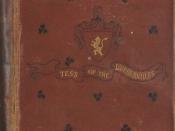The author Thomas Hardy lived and wrote in a time of difficult social change, when England was making its slow and painful transition from an old-fashioned, agricultural nation to a modern, industrial one. Businessmen and entrepreneurs, or "new money," joined the ranks of the social elite, as some families of the ancient aristocracy, or "old money," faded into obscurity. Hardy's novel Tess of the d'Urbervilles clearly illustrates his views on the harsh social changes in his time period, which were the exact opposite of many of his conservative and status-conscious readers. In the novel, Hardy mocks the power of high class society and industrialization, as well as to the importance of lineage and heritage in conjunction with social status. The novel also expresses Hardy's sympathetic views towards people of lower social class and the effects social change and industrialization was inflicting on them. Through the three main characters of the story, Tess Durbeyfeild, Angel Clare, and Alec Stokes-d'Urberville, Hardy expresses the confusion regarding social classes in his time period.
Alec is the character who is an ideal representation of the new industrial-based society forming in England, while Tess embodies the pure, old and agricultural side of society undergoing change, and Angel symbolizes the futile and confusing struggle for change between the two forms of society. The Angel-Tess-Alec triangle strongly conveys the confusion Victorians were undergoing in social classes in order to accommodate the changing English social system.
Angel Clare is perhaps one of the most direct depictions in Hardy's novel that clearly shows the severity of social confusion that was present during his time period. Throughout the entire novel, Angel's morals and beliefs, and the basic composition of his character, are a string of social-related hypocrisies and are evidence that a majority of Victorian society was stuck...


